Related Research Articles
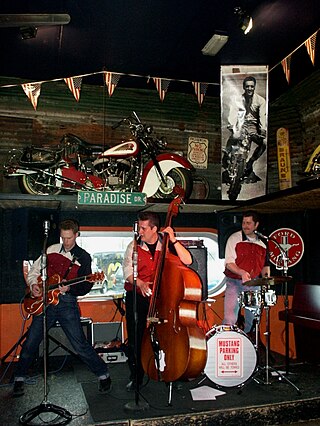
Rockabilly is one of the earliest styles of rock and roll music. It dates back to the early 1950s in the United States, especially the South. As a genre it blends the sound of Western musical styles such as country with that of rhythm and blues, leading to what is considered "classic" rock and roll. Some have also described it as a blend of bluegrass with rock and roll. The term "rockabilly" itself is a portmanteau of "rock" and "hillbilly", the latter a reference to the country music that contributed strongly to the style. Other important influences on rockabilly include western swing, boogie-woogie, jump blues, and electric blues.

Lindley Armstrong "Spike" Jones was an American musician, bandleader and conductor specializing in spoof arrangements of popular songs and classical music. Ballads receiving the Jones treatment were punctuated with gunshots, whistles, cowbells, hiccups, burps, and outlandish and comedic vocals. Jones and his band recorded under the title Spike Jones and His City Slickers from the early 1940s to the mid-1950s, and they toured the United States and Canada as "The Musical Depreciation Revue".
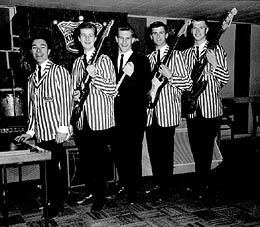
The Kingsmen are a 1960s American rock band from Portland, Oregon. They are best known for their 1963 recording of R&B singer Richard Berry's "Louie Louie", which held the No. 2 spot on the Billboard charts for six weeks and has become an enduring classic.

Beatboxing is a form of vocal percussion primarily involving the art of mimicking drum machines, using one's mouth, lips, tongue, and voice. It may also involve vocal imitation of turntablism, and other musical instruments. Beatboxing today is connected with hip-hop culture, often referred to as "the fifth element" of hip-hop, although it is not limited to hip-hop music. The term "beatboxing" is sometimes used to refer to vocal percussion in general.

John Marty Stuart is an American country and bluegrass music singer, songwriter, and musician. Active since 1968, Stuart initially toured with Lester Flatt, and then in Johnny Cash's road band before beginning work as a solo artist in the early 1980s. He is known for his combination of rockabilly, country rock, and bluegrass music influences, his frequent collaborations and cover songs, and his distinctive stage dress.
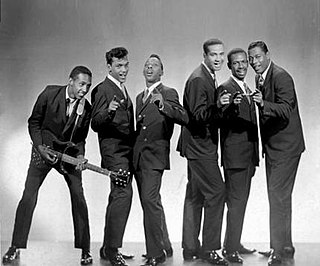
The Contours are an American rhythm and blues group. They are known their 1962 hit single "Do You Love Me", which sold over 1 million copies and became a major hit again in 1988.
"Everybody's Trying to Be My Baby" is a rockabilly song often credited to Carl Perkins. Based on a 1936 song written by singer/songwriter Rex Griffin, it achieved widespread popularity when it was released in 1957 by Perkins and covered by the Beatles in 1964.
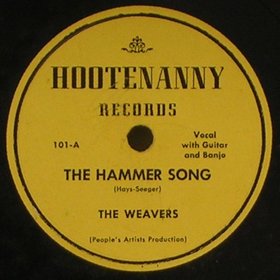
"If I Had a Hammer " is a protest song written by Pete Seeger and Lee Hays. It was written in 1949 in support of the Progressive movement, and was first recorded by the Weavers, a folk music quartet composed of Seeger, Hays, Ronnie Gilbert, and Fred Hellerman. It was a #10 hit for Peter, Paul and Mary in 1962 and then went to #3 a year later when recorded by Trini Lopez in 1963.

Songs for Young Lovers is the seventh studio album by Frank Sinatra and his first on Capitol Records. It was issued as an 8-song, 10" album and as a 45rpm EP set, but it was the first Sinatra "album" not to have a 78rpm multi-disc-album release. In 2002, it was one of 50 recordings chosen that year by the Library of Congress to be added to the National Recording Registry.

Sinatra And Swingin' Brass is the twenty-sixth studio album by American singer Frank Sinatra. Released in 1962, it is Sinatra's fifth album released by Reprise Records.
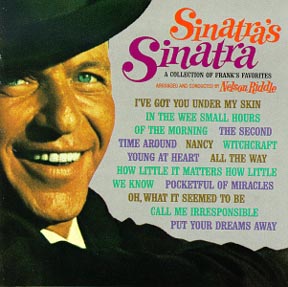
Sinatra's Sinatra is an album by American singer Frank Sinatra, released in 1963.
"All the Way" is a song published in 1957 by Maraville Music Corporation. The music was written by Jimmy Van Heusen with lyrics by Sammy Cahn.

King Records was an American label founded in 1943 by Syd Nathan in Cincinnati, Ohio, United States. The label owned several divisions, including Federal Records, which launched the career of James Brown. It released original material until 1975.
Joe Perkins was an American singer whose song, "Little Eeefin' Annie", was a minor hit in 1963, reaching number 76 on the Billboard chart. The song featured eefer Jimmie Riddle. He was born in Nashville, Tennessee.

"(I've Had) The Time of My Life" is a 1987 song composed by Franke Previte, John DeNicola, and Donald Markowitz. It was recorded by Bill Medley and Jennifer Warnes, and used as the theme song for the 1987 film Dirty Dancing. The song has won a number of awards, including the Academy Award for Best Original Song, the Golden Globe Award for Best Original Song, and the Grammy Award for Best Pop Performance by a Duo or Group with Vocals.
James Lawrence Riddle was an American country musician and multi-instrumentalist best known for his appearances on the country music and comedy television show Hee Haw. He was primarily known for the vocal art of eefing.
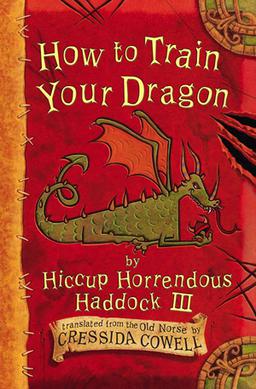
How to Train Your Dragon is a series of children's books written by British author Cressida Cowell. The books are set in a fictional Fantasy Viking world, and focus on the experiences of protagonist Hiccup Horrendous Haddock the Third, as he overcomes obstacles on his journey of "becoming a hero, the hard way". The books were published by Hodder Children's Books in the UK and by Little, Brown and Company in the US. The first book was published in 2003 and the 12th and final one in 2015. By 2015, the series had sold more than seven million copies around the world. The books have subsequently been adapted into a media franchise consisting of three animated feature films, several television series and other media, all produced by DreamWorks Animation.

"Dweller on the Threshold" is a song written by Northern Irish singer-songwriter Van Morrison and first released on his 1982 album Beautiful Vision. It was released as a single on the B-Side in 1982 with the instrumental "Scandinavia" as the "A" side. Another release in 1984 had a live version of "Dweller on the Threshold" as the A-Side.
That's Just the Woman in Me is a one-off American television special by the Canadian singer Celine Dion that was broadcast by CBS on 15 February 2008 and was recorded at the Wiltern Theatre in Los Angeles, California, on 12 January 2008. The show celebrated her return to performing after five years in Las Vegas and was a promotion for her latest studio album, Taking Chances.

Dance Again... the Hits is the first greatest hits album of American singer Jennifer Lopez. It was released on July 20, 2012, by Epic Records, to coincide with the launch of her first world tour, the Dance Again World Tour. Lopez previously conceived plans for a greatest hits album in 2009, but instead opted to use the material recorded for her seventh studio album, Love? (2011), which was released by Island Records in May 2011 after her departure from Epic Records in 2010. As Lopez owed the label one last album to fulfill her contract, she began work on a new greatest hits album in November 2011. She later became unsure whether she wanted to go along with plans to release a greatest hits album or a new studio album, eventually deciding on the former.
References
- Jennifer Sharpe, Jimmie Riddle and the Lost Art of Eephing, National Public Radio, March 13, 2006. Accessed March 20, 2006. Includes audio in RealAudio and Windows Media Player formats.
- Joe Perkins' Little Eeefin' Annie page